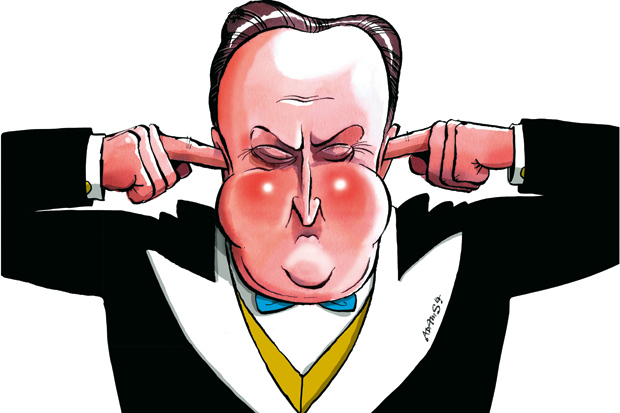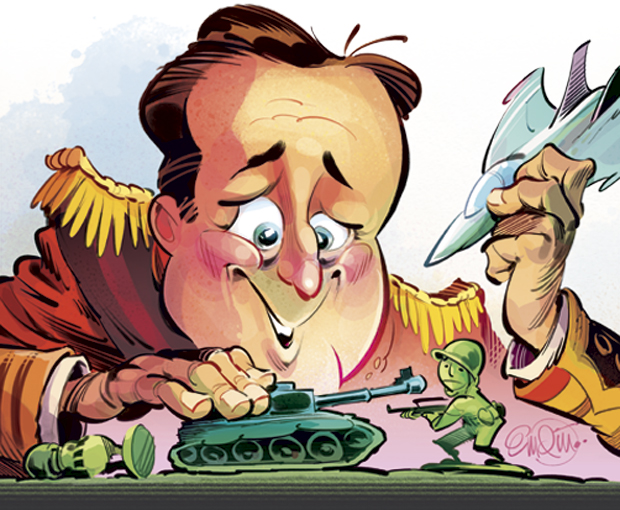Listen
It must have come so easily back then. In April 2006, the young David Cameron had already assumed the mantle of leader of the Conservative party as arranged by his predecessor, Michael Howard. And as he prepared to assume the next highest office, the insult fell from his mouth with extraordinary ease. ‘Ukip is sort of a bunch of fruit cakes and loonies and closet racists,’ he told his radio interviewer. Deadly. Though not, as it finally turned out, for the party he was attacking.
Last week that same Ukip topped the British polls at the European elections. It knocked the Conservative party into third place and helped cause Britain’s most Europhile party, the Liberal Democrats, to come fifth with a single seat. Ukip also made extraordinary council gains across the country and is now our largest political party not only in Brussels but in significant portions of Britain. It averaged an astonishing 51 per cent of the vote in Boston, Lincolnshire — an area which has suffered unprecedented levels of recent immigration. Ordinarily, lessons would be taken from this. But these are not politically ordinary times.
In the days following the results the Conservative party and its increasingly loyal media chorus focused on everything other than the main story. The parochialism of Westminster politics and the Westminster media lobby — among the forces to have fuelled Ukip’s rise — has rarely seemed greater.
First of all, the proposed lesson of the election was that Ed Miliband, while significantly increasing Labour’s share of council seats, had not increased that share by a vast enough number. This, combined with an alleged inability to eat a bacon sandwich in a properly prime ministerial fashion, persuaded the Westminster media bubble that the story was that Ed is a big loser. The second bubble EU election story was Nick Clegg’s transformation from sometime boy-wonder (in whose eyes exactly?) into bloodshot failure. Both stories are interesting if you are a Westminster-watcher and delightful if you are a Cameron courtier. But the bigger story was avoided. And if Cameron avoids it too then the Miliband premiership will indeed become — as the polls say it will — not a prediction but reality.
Because the deep, underlying story of last week is clear: the British public have made the connection between the EU and mass immigration. They do not like the latter and they blame it on the former. For years polls have continued to show that the vast majority of the British public want immigration reduced. The figures are always similar and we are — it is important to note — never talking about a minority opinion here. One recent poll showed that 77 per cent of the public want immigration reduced, while 78 per cent said that England is overcrowded and a staggering 85 per cent say that immigration is placing too much pressure on public services. It takes an absolutely blind political class not to see what the public can most certainly see.
Unfortunately for the Conservative party, they appear to be led by just such people. Within hours of the results, George Osborne was saying that he ‘respected’ Nigel Farage, but insisted that Ukip does not have ‘answers to the country’s future’. Does he think people will conclude that the Conservative party does? This is the second government in a row which promised to massively reduce immigration while actually seeing it dramatically rise. And while Conservative party spokesmen have insisted that the public had sent a ‘message’ which the government has ‘heard’, it took a Tory grandee — and one of David Cameron’s gurus — to express a less varnished truth.
When Michael Heseltine was interviewed from his country estate on Newsnight the day after the EU election results, it was put to him that Ukip’s victories represented a ‘repudiation’ of the EU. ‘No, I don’t believe that,’ he replied confidently. So why are people voting for Ukip? ‘Because it’s the place to go to protest about certain things that have been happening which they associate with Europe.’ ‘Associate’? As in ‘a trick of the brain’. And is the party racist? ‘There are racists among them,’ Heseltine replied. ‘I’ve heard enough speeches by Ukip members to make me wince with embarrassment.’
The wincing might easily be reciprocal. For here, in the voice of David Cameron’s mentor, is the true voice of the Conservative hierarchy. ‘It is all a misunderstanding. We hear what you are saying and we are trying to be polite. But you’re wrong.’
Sources in No. 10 say that this politics of repudiation remains the dominant attitude among those surrounding the Prime Minister. Even after the recent elections the message around him remains the same. ‘Don’t worry, Dave. The economy will win it for you. All these errant Ukippers will see sense and vote Tory when they realise how ghastly Ed Miliband is. And by the way, there’s no point in giving any quarter, let alone even considering a deal with Ukip, because they’re all ghastly racists anyway.’
At the root of this de haut en bas Tory attitude is not only a moral but a political miscalculation. It remains assumed that when the public come to the general election they will resist this childish urge to vote Ukip and come back to the party which has been carefully insulting them. The polls, however, show something quite different.
In March, the Conservative peer Lord Ashcroft commissioned an opinion survey of 20,000 people. Among its findings was that of the 2,300 people who said that they would vote Ukip in the general election, just over half (51 per cent) went on to disagree with the statement that ‘a vote for Ukip at the next general election makes the prospect of Ed Miliband becoming prime minister more likely’. A further 16 per cent of Ukip voters said they didn’t know whether they agreed with this or not. Almost a quarter (23 per cent) of Ukip voters said they did believe their vote would make Miliband becoming PM more likely, but said this would not affect their vote. These people have had enough of both parties and will not be moved by claims that there is any serious difference between them. But the most striking thing about the Ashcroft poll is that it means only one in ten EU-election Ukip supporters agrees that a vote for Ukip increases the chances of a Miliband government and acknowledges that this might affect the way they end up voting. So Cameron’s ‘Vote Ukip, get Ed’ line of last resort won’t wash.
Obviously polls like this have to be taken with a degree of caution. People are notoriously unreliable in their estimates of how they may or may not behave a year from now. But there is much about these figures that rings true. In recent days and months I have spoken to a number of Ukip voters who have told me something very similar. Many, though by no means all, are former Conservative voters. Some were once members. And their message is strikingly consistent. They are fed up of being told by politicians of any stripe that they know better than voters what the voters are thinking. And no, they insist, they are not ‘protesting’. They are expressing legitimate concern about the direction this country is heading in. And they are not just delighted but energised by finding a decent political party which shares and expresses their concerns. At a time when the Conservative party is relying on postal votes to ensure its remaining supporters actually vote, it is striking that Ukip voters positively enthuse about the ballot-box experience.
So how might Cameron and co turn it around? Thanks to the outbursts of the past, it is very hard. Cameron could concede that Ukip has some points. It could also do what Ukip can currently only talk about. It is undeniably the case that unless Britain fundamentally alters its relationship with Europe then no UK government can do anything meaningful about immigration levels. He might also finally start to address what the public can so overwhelmingly see — that immigration is not a matter of ‘diversity’ or food variety, but unsustainable numbers.
Will Cameron finally do something about the 100,000 foreign students each year (largely from the Indian subcontinent) who come to this country and fail to leave? Could the Conservative party do what no political party other than Ukip is doing and ask how many people we can actually take in? If immigration continues at the level it has averaged over the last ten years, Britain will be adding 10 million more people to the population in the next 20 years. That means building a new house roughly every seven minutes. Is anybody really up for that? Is there any politician whose plan for this country really is to tarmac over all remaining green parts of the country so as to become the biggest possible hotel for the world’s economic migrants? If not, would a little bit of political leadership really hurt so much?
For years Ukip has been damned by its political opponents as racist, xenophobic, homophobic, misogynistic, backward, knuckle-dragging, rag-tag and ramshackle. But they turn out to be deadly and effective: for the Conservative party most of all. Having scorned them and their complaints for so long, it is hard to see how Cameron can now change course and mend this part of his own flank without in consequence looking ridiculous. Caught in this bind, even some Conservative party loyalists are now wondering whether David Cameron might not go down in electoral history as the man who divided the right and then did so badly that in 2010 that he had to form a coalition with the Lib Dems (RIP) before going on to lose the 2015 general election to Ed Miliband.
Throughout Cameron’s leadership, the Conservative party appears to have been losing patience with the people who used to vote for it. Whether at the by-election in Newark next week (where Ukip last week topped the polls) or in next year’s general election, at some stage, and with brutal finality, it looks like the people are going to return the favour.
Got something to add? Join the discussion and comment below.
Get 10 issues for just $10
Subscribe to The Spectator Australia today for the next 10 magazine issues, plus full online access, for just $10.
You might disagree with half of it, but you’ll enjoy reading all of it. Try your first month for free, then just $2 a week for the remainder of your first year.















Comments
Don't miss out
Join the conversation with other Spectator Australia readers. Subscribe to leave a comment.
SUBSCRIBEAlready a subscriber? Log in